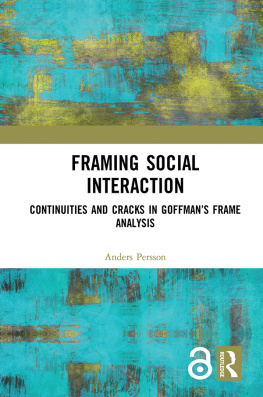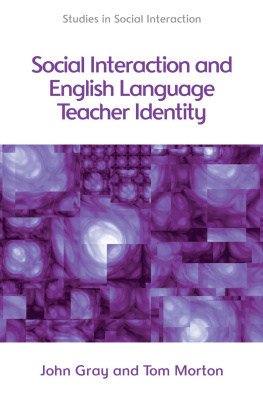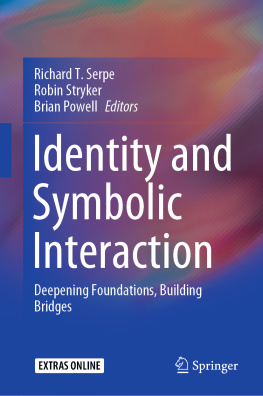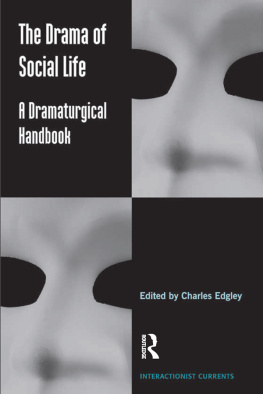Contents
Guide
Pages

Negotiating Identity
Symbolic Interactionist Approaches to Social Identity
Susie Scott
polity
Copyright Susie Scott 2015
The right of Susie Scott to be identified as Author of this Work has been asserted in accordance with the UK Copyright, Designs and Patents Act 1988.
First published in 2015 by Polity Press
Polity Press
65 Bridge Street
Cambridge CB2 1UR, UK
Polity Press
350 Main Street
Malden, MA 02148, USA
All rights reserved. Except for the quotation of short passages for the purpose of criticism and review, no part of this publication may be reproduced, stored in a retrieval system, or transmitted, in any form or by any means, electronic, mechanical, photocopying, recording or otherwise, without the prior permission of the publisher.
ISBN-13: 978-1-5095-0077-2
A catalogue record for this book is available from the British Library.
Library of Congress Cataloging-in-Publication Data
Scott, Susie, 1977
Negotiating identity : symbolic interactionist approaches to social identity / Susie Scott.
pages cm
Includes bibliographical references and index.
ISBN 978-0-7456-6972-4 (hardback) -- ISBN 978-0-7456-6973-1 (pbk.) 1. Group identity. I. Title.
HM753.S326 2015
305--dc23
2014048138
The publisher has used its best endeavours to ensure that the URLs for external websites referred to in this book are correct and active at the time of going to press. However, the publisher has no responsibility for the websites and can make no guarantee that a site will remain live or that the content is or will remain appropriate.
Every effort has been made to trace all copyright holders, but if any have been inadvertently overlooked the publisher will be pleased to include any necessary credits in any subsequent reprint or edition.
For further information on Polity, visit our website: politybooks.com
Acknowledgements
I would like to thank Jonathan Skerrett at Polity for his conscientious support for and helpful advice with this book, from proposal through to publication. I am also grateful to the three anonymous reviewers who provided extremely positive and encouraging feedback on the first draft of the manuscript.
Earlier versions of some of the writing in appeared in my book Total Institutions and Reinvented Identities (Palgrave, 2011)and article Intimate deception in everyday life (Studies in Symbolic Interaction, 39, 25179), so I appreciate the publishers permission to reproduce this material. I am also grateful to my students Sarah Hamilton and Sophie Bishop for allowing me to cite examples from their excellent research projects.
Thank you to my Sussex colleagues, family and friends who have been kind and encouraging throughout the writing process: particularly Hilde, Karin, Dagmara and Vuokko (the Nordic contingent) and James, Liz, Karl and Lucy.
Interacting selves
Symbolic interactionism encounters identity
Identity is an evocative and intriguing concept, replete with paradoxes. On the one hand, it refers to something private and personal our understanding of ourselves yet, on the other hand, it remains intangible, elusive and resistant to definition (Strauss 1969). We may think we know who we are, but these ideas are constantly changing, shaped by our experiences, relationships and interactions: who I am now is not the same as who I was yesterday or who I will be tomorrow. We also tend to think of identity as something highly individual, which marks us out as unique yet in forming these self-images we inevitably draw on wider cultural representations, discourses, norms and values, which we share with those who inhabit our social worlds.
Sociologists have always been interested in identity, because it resonates with many of the issues and debates that characterize our discipline. Interpretivist sociology, in particular, is concerned with the relationship between self and society (Hewitt 2007), which is mutually constitutive: the social world is created by people interacting in routinized and orderly ways, while the meanings they attach to these experiences are shaped by those very patterns, in the form of socially constructed structures, institutions and normative frameworks. Max Weber, on whose work this tradition is based, argued that sociology should involve the interpretive study of social action: the process by which individuals organize and make sense of their behaviour by taking into account other peoples meanings and motivations (Weber 1904). We think, feel and behave not as isolated individuals, but as social actors with a relational consciousness. Meanwhile, sociologys aims to make the familiar strange (Garfinkel 1967) and relate private troubles to public issues (Mills 1959) are relevant to the study of identity as an aspect of everyday life that we often take for granted, despite its social and political dimensions. The latter have come to prominence since the mid-twentieth century through the rise of identity politics, citizenship debates and civil rights activism, reminding us that, aside from academic theorizing, we have a moral and ethical duty to investigate identities (Wetherell 2009).
What is identity?
Identity can be defined as a set of integrated ideas about the self, the roles we play and the qualities that make us unique. Ostensibly, this implies a relatively stable entity, which we perceive as internally consistent (Allport 1961; Gergen 1968), and use to sustain a boundary between ourselves and others. However, this very image may just be a construction: one that is constantly changing and whose existence is more illusory than real. Lyman and Scott (1970) conceive identity as an aggregate of social roles that one has played across different situations, which together create the impression of something trans-situational, or greater than the sum of its parts. Turner (1968), similarly, points towards a succession of situated selves that we inhabit as we move between social settings, which are averaged out to create an overall sense of identity. Here we encounter what Lawler (2008) suggests is a central paradox of identity: that it combines notions of sameness and continuity with notions of difference and distinctiveness.
A similar duality is recognized by Williams (2000), who makes a distinction between identity, a sense of oneself as a coherent and stable entity, and identification, a social process of categorizing ourselves as similar to certain social groups and different from others. Social identity is therefore relational: defined relative to other people or groups. I find out who I am by knowing what I am not: understanding where and with whom I do (or dont) belong. For example, the Twenty Statements Test, devised by Iowa sociologists Kuhn and McPartland (1954), asked students to write a list of twenty words to describe themselves. The overwhelming majority of these referred to social categories, roles, statuses and group memberships, such as gender, age, ethnicity, occupation and family relationships. Other common descriptors that were found, such as ideological beliefs, interests, ambitions and self-evaluations, can also be seen as socially shaped.
We can distinguish identity from two closely related concepts: selfhood and personhood. Selfhood is a reflexive state of consciousness about ones internal thoughts and feelings, while personhood is a set of publicly presented or externally attributed characteristics that others use to determine our status (Jenkins 2004), with moral, philosophical or political connotations. Cohen (1994) similarly points to the primacy of the










